
SOFTWARE QUALITY JOURNAL
metrics 2024
Connecting academia and industry for software excellence.
Introduction
SOFTWARE QUALITY JOURNAL, published by Springer, is a preeminent platform dedicated to advancing the field of software engineering and quality assurance. With an ISSN of 0963-9314 and an E-ISSN of 1573-1367, this journal serves as a vital resource for academics and practitioners alike, bridging the gap between theoretical frameworks and practical applications. The journal is recognized for its impactful contributions, holding a remarkable Q1 ranking in Media Technology and demonstrating strong performance with Q2 placements in Safety, Risk, Reliability and Quality, as well as Software, solidifying its reputation in the academic community. As of 2023, the journal is ranked 64th in Safety, Risk, Reliability and Quality and 176th in Computer Science Software on Scopus, showcasing its relevance and influence. Covering a broad range of topics from software quality metrics to risk management strategies, SOFTWARE QUALITY JOURNAL aims to foster innovation and best practices in software development. Join a community of leading researchers and professionals committed to enhancing the quality and reliability of software systems.
Metrics 2024
 0.63
0.63 1.70
1.70 1.90
1.90 49
49Metrics History
Rank 2024
Scopus
IF (Web Of Science)
JCI (Web Of Science)
Quartile History
Similar Journals
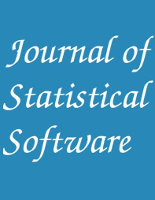
Journal of Statistical Software
Transforming data into knowledge with open access solutions.Journal of Statistical Software, published by the esteemed Journal Statistical Software, stands as a premier platform for the dissemination of cutting-edge research in the fields of statistical software development, methodologies, and applications. With an impressive impact factor and consistently ranking in the Q1 quartile for Software, Statistics and Probability, and Statistics, Probability and Uncertainty as of 2023, this journal is recognized globally for its scholarly contributions and innovative content. The journal has been an Open Access publication since 1996, facilitating unrestricted access to high-quality research for a diverse audience, including researchers, professionals, and students. As the journal converges into its 28th volume in 2024, it continues to maintain a strong presence in key academic rankings—evidenced by its stellar Scopus rank, where it is placed in the top 5% of journals in its field. Located at UCLA Department of Statistics, in Los Angeles, this journal is dedicated to fostering the advancement of statistical software and its role in enhancing scientific research across multiple disciplines.
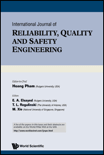
International Journal of Reliability Quality and Safety Engineering
Championing Reliability and Safety in Engineering DisciplinesThe International Journal of Reliability Quality and Safety Engineering, published by World Scientific Publishing Co Pte Ltd, is a leading platform for disseminating cutting-edge research in the fields of reliability, quality, and safety engineering. With an impressive scope that spans across aerospace, electrical engineering, nuclear energy, and industrial manufacturing, this journal serves as a critical resource for researchers and professionals aiming to enhance system dependability and operational excellence. Indexed in Scopus, it holds a respectable Q3 ranking across various categories in 2023, reflecting its growing influence in the academic community. Although currently not open access, it provides ample opportunities for scholars to publish impactful studies from its extensive database, which has evolved since 1996. The journal's commitment to advancing knowledge in reliability and safety engineering makes it a pivotal resource for those dedicated to improving engineering practices and protocols worldwide.
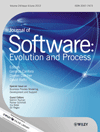
Journal of Software-Evolution and Process
Innovating Processes for Tomorrow's SoftwareThe Journal of Software-Evolution and Process, published by WILEY, is a premier academic journal dedicated to advancing knowledge in the field of software evolution and methodologies. With an impact factor that places it in the Q2 quartile of software-related research, this journal is widely recognized for its rigorous peer-reviewed articles that explore the dynamics of software development, maintenance, and transformation. Addressing the challenges faced by software engineers and researchers, the journal seeks to provide innovative insights and solutions, fostering both theoretical understanding and practical applications. Since its inception in 2012, Journal of Software-Evolution and Process has contributed significantly to the academic community, featuring research that is highly relevant to contemporary trends and technologies in the software industry. For those committed to enhancing their expertise, this journal provides an invaluable resource via open access options.

Journal of Advances in Information Technology
Pioneering Research for a Digital TomorrowJournal of Advances in Information Technology, published by ENGINEERING & TECHNOLOGY PUBLISHING, is an essential platform for researchers, professionals, and students invested in the dynamic fields of information technology, artificial intelligence, and computer science. With its ISNN of 1798-2340, this journal provides a rigorous peer-reviewed environment that supports the dissemination of innovative research findings, methodologies, and case studies. Since its inception in 2019, it has made notable strides, as reflected in its Q3 quartile rankings across various categories, including Artificial Intelligence and Software, and maintains respectable Scopus rankings, further solidifying its position as a key player in the academic community. Featuring a diverse range of topics within its scope, the journal encourages open access to knowledge while serving as a beacon for those seeking to expand their understanding of current trends and technologies shaping the future. Join us in advancing the field with impactful research that is both relevant and cutting-edge.
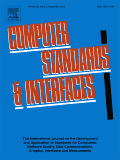
COMPUTER STANDARDS & INTERFACES
Pioneering Insights at the Intersection of Technology and Law.COMPUTER STANDARDS & INTERFACES is a prestigious journal published by Elsevier, dedicated to the intersection of technology, law, and standards in computing. With an impressive impact factor and categorized in the Q1 quartile across several relevant fields, including Computer Science Applications, Hardware and Architecture, and Software, this journal has established itself as a critical resource for researchers and professionals alike. Covering a comprehensive range of topics over its converged years from 1986 to 2025, it provides rigorous peer-reviewed articles and vital insights into the evolving landscape of computer standards. The journal's Scopus rankings affirm its significance with top percentiles in multiple categories, including a remarkable 12th rank in Social Sciences and Law. COMPUTER STANDARDS & INTERFACES welcomes contributions that push the boundaries of knowledge and foster discussions on best practices and innovations, making it an invaluable platform for students and seasoned researchers passionate about advancing the field.
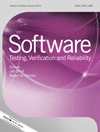
SOFTWARE TESTING VERIFICATION & RELIABILITY
Transforming Risk Management Through Scholarly CollaborationSOFTWARE TESTING VERIFICATION & RELIABILITY, published by Wiley, serves as a premier journal in the fields of software engineering, risk management, and quality assurance. With an ISSN of 0960-0833 and E-ISSN 1099-1689, this journal has been a pivotal resource since its inception in 1991, providing insights into the latest methodologies and technologies related to software testing and verification through to 2024. The journal is recognized for its rigorous peer-review process and boasts an impressive reputation, rated Q2 in Media Technology and Safety, Risk, Reliability and Quality, along with a Q3 rank in Software as of 2023. Its Scopus ranks further solidify its standing within the academic community, placing it in the 62nd and 43rd percentiles for Engineering and Computer Science, respectively. The journal fosters a collaborative environment for researchers, professionals, and students, encouraging the exploration of cutting-edge research, applications, and innovations in software testing and reliability, making it an invaluable asset for those seeking to advance their knowledge and expertise in this essential area.
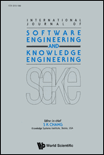
INTERNATIONAL JOURNAL OF SOFTWARE ENGINEERING AND KNOWLEDGE ENGINEERING
Exploring Innovations in Engineering and IntelligenceThe INTERNATIONAL JOURNAL OF SOFTWARE ENGINEERING AND KNOWLEDGE ENGINEERING, published by WORLD SCIENTIFIC PUBL CO PTE LTD in Singapore, is a pivotal platform for disseminating cutting-edge research in the fields of software engineering and knowledge systems. With an ISSN of 0218-1940 and an E-ISSN of 1793-6403, this journal has been a reliable resource for scholars and practitioners since its inception in 1996. The journal is indexed across multiple prestigious databases, reflecting its relevance with a Category Quartile ranking of Q3 in both Computer Graphics and Computer Networks for 2023, and it maintains a steady trajectory of growth and scholarly contribution. Although not an Open Access journal, it is accessible through various academic institutions and libraries, ensuring researchers can engage with high-quality, peer-reviewed articles that explore advancements, theoretical developments, and practical applications in software and knowledge engineering. As it converges towards its end year of 2024, this journal continues to foster innovation and knowledge exchange, making it an essential resource for anyone invested in these dynamic fields.
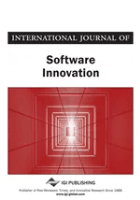
International Journal of Software Innovation
Unleashing Creativity in Software Engineering.The International Journal of Software Innovation, published by IGI Global, serves as a crucial platform for disseminating cutting-edge research in the field of software engineering and innovation. With its ISSN 2166-7160 and E-ISSN 2166-7179, this journal has a broad scope that encompasses multiple areas of computer science, including Artificial Intelligence, Computer Graphics and Computer-Aided Design, Computer Networks and Communications, Software, and Computer Science Applications. Since its inception in 2017 and continuing until 2024, the journal has established itself in Q4 quartiles across various categories, reflecting both emerging trends and foundational principles in software innovation. Although it does not currently follow an Open Access model, its findings are vital for researchers, professionals, and students aiming to understand and contribute to the evolving landscape of software technologies. Located in the United States at 701 E Chocolate Ave, Ste 200, Hershey, PA 17033-1240, this journal not only offers research insight but also encourages collaboration and knowledge sharing among scholars worldwide.

International Journal on Software Tools for Technology Transfer
Advancing Software Solutions for Seamless Technology TransferInternational Journal on Software Tools for Technology Transfer (ISSN: 1433-2779; E-ISSN: 1433-2787), published by SPRINGER HEIDELBERG, stands as a pivotal platform for advancing the intersection of software engineering and technology transfer. Operating out of Germany, this esteemed journal has contributed significantly to the field since its inception in 1997 and continues to disseminate cutting-edge research through 2024. With a current impact footprint reflected in its Q2 status in Information Systems and Q3 in Software categories, it holds an impressive Scopus rank in the top 60th and 52nd percentiles respectively. Researchers, professionals, and students alike will find its commitment to exploring innovative software tools and techniques essential for enhancing technology transfer processes invaluable. Although the journal does not offer open access, its rigorously peer-reviewed articles are crucial for those seeking high-quality research insights.

Automated Software Engineering
Bridging Academia and Industry through AutomationAutomated Software Engineering is a premier journal dedicated to advancing the field of software engineering through the exploration of innovative methodologies, tools, and applications. Published by Springer since its inception in 1994, this journal has established itself as a vital resource for researchers, industry professionals, and students alike, providing insights into the latest trends and technological advancements. With an impressive impact factor and currently ranked in the Q2 quartile of the Software category, it is recognized for its contribution to the discipline. The journal covers a broad scope of topics including automation in software development, empirical studies, and theoretical advancements, fostering discussions that bridge academia and industry. As we look forward to converging towards the year 2024, the journal continues to invite high-quality submissions that challenge existing paradigms and pave the way for future innovations in software engineering.